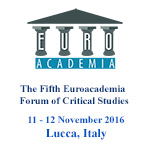Euroacademia Conferences
 Europe Inside-Out: Europe and Europeanness Exposed to Plural Observers (9th Edition) April 24 - 25, 2020
Europe Inside-Out: Europe and Europeanness Exposed to Plural Observers (9th Edition) April 24 - 25, 2020 Identities and Identifications: Politicized Uses of Collective Identities (9th Edition) June 12 - 13, 2020
Identities and Identifications: Politicized Uses of Collective Identities (9th Edition) June 12 - 13, 2020 8th Forum of Critical Studies: Asking Big Questions Again January 24 - 25, 2020
8th Forum of Critical Studies: Asking Big Questions Again January 24 - 25, 2020 Re-Inventing Eastern Europe (7th Edition) December 13 - 14, 2019
Re-Inventing Eastern Europe (7th Edition) December 13 - 14, 2019 The European Union and the Politicization of Europe (8th Edition) October 25 - 26, 2019
The European Union and the Politicization of Europe (8th Edition) October 25 - 26, 2019 Identities and Identifications: Politicized Uses of Collective Identities (8th Edition) June 28 - 29, 2019
Identities and Identifications: Politicized Uses of Collective Identities (8th Edition) June 28 - 29, 2019 The European Union and the Politicization of Europe (7th Edition) January 25 - 26, 2019
The European Union and the Politicization of Europe (7th Edition) January 25 - 26, 2019 7th Forum of Critical Studies: Asking Big Questions Again November 23 - 24, 2018
7th Forum of Critical Studies: Asking Big Questions Again November 23 - 24, 2018 Europe Inside-Out: Europe and Europeanness Exposed to Plural Observers (8th Edition) September 28 - 30, 2018
Europe Inside-Out: Europe and Europeanness Exposed to Plural Observers (8th Edition) September 28 - 30, 2018 Identities and Identifications: Politicized Uses of Collective Identities (7th Edition) June 14 - 15, 2018
Identities and Identifications: Politicized Uses of Collective Identities (7th Edition) June 14 - 15, 2018
Models of Continuity and Crisis of Perseverance: Contemporary Issue vis-à-vis Selected European Paradigms and Overlooked Notions
-
-

-
Presentation speakers
- Slobodan Dan Paich, Artship Foundation, San Francisco, USA
- Download presentation
Abstract:
In opening, the presentation protocols of this inquiry are stated and the reflective standards, open questions and invitation to discussion are set forth, contextualizing the issues and themes deliberated. Elements from Mediterranean roots of Europe:
Reflections on almost invisible histories generated by the oral traditions of Tarantella Pizzica, and related Pan-Mediterranean practices are presented. Examples of communally held practices of trained memory and assimilation of knowledge without visible notation are assessed. Aspects of Pre Classical roots of Europe: Exploring the limits and values of UNESCO intangible heritage recognition and the contemporary process of commodification in the case of Corsican and Albanian archaic polyphonic singing that has possible pre-historic origins of the communal training and retention. Overlooked Dynamic of Classical Influences: Re-examining anew European self-image of the ninetieth century education and world-views with the formative question: Why, How and by Whom the Platonic Academy resurfaced in sixteenth century Florence where their seemingly most important ideas were not written down but instead “intentionally remembered,” probably for about one thousand years? Facet contributing to the axioms of Constitutional Democracies: Probing in to the nexus of ideas surrounding formation of European sovereign nations and related establishment of National Opera Houses constellated originally around the Viva Verdi cry, opera repertoire and theater architecture of Italian Risorgimento. Social ritual of the Opera House seen as shared education of then acceptable feelings, values and cultural identity. In closing the issues of a possible contemporary Crisis of Perseverance, current de-contextualized information and the neuroscience and cognitive research notions of ecology of mind and brain are paired with the historic examples of learning models cited in the paper. It is a proactive starting point for discussion about the contemporary state of mind and learning preparedness and lesser-known European cultural paradigms. -
Related Presentations

Spenser’s Lacanian Assault on the Classical Hero
- Vincent Mennella













